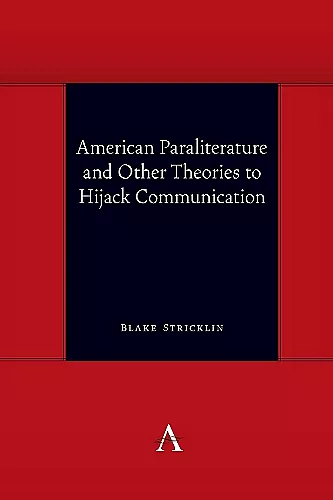American Paraliterature and Other Theories to Hijack Communication
Format:Hardback
Publisher:Anthem Press
Published:30th Mar '21
Currently unavailable, and unfortunately no date known when it will be back

A critical account of the 1975 Schizo-Culture Columbia conference examining the generative encounters of post-1968 French theory with postwar American avant-garde
A critical account of the 1975 Schizo-Culture conference, which Michel Foucault called “the last countercultural event of the 1960s,” and its direct and indirect connection to American experimental literature.
American Paraliterature examines the generative encounters of post-1968 French theory with the postwar American avant-garde. The book begins with an account of the 1975 Schizo-Culture conference that was organized by Semiotext(e) editor Sylvère Lotringer at Columbia University. The conference was an attempt to directly connect the American avant-garde with French theory. At the event, John Cage shared the stage with Deleuze and Foucault introduced William S. Burroughs. This schizo-connection presents a way to read the experimental methods of the American avant-garde (Burroughs, Cage, and Kathy Acker), and how their writing creates a counterprogram to the power that Foucault and Deleuze started to articulate in the 1970s.
“‘There’s a familiar story about the arrival of poststructuralist theory in U.S. universities with Roland Barthes, Jacques Derrida, and Jacques Lacan presenting papers at a conference at Johns Hopkins in 1966. Another event almost a decade later, the Schizo-Culture Conference at Columbia in 1975, attended by Michel Foucault, Gilles Deleuze, Félix Guattari, John Cage, and William Burroughs, and its aftershocks, felt by the likes of Kathy Acker, Samuel R. Delany, and others, along with the former is the subject of this invaluable book. Stricklin traces the ways Schizo-Culture blew the doors off humanism, transforming contemporary literature and culture through an “American rhizome” far weirder and more punk than the influences of the so-called structuralist controversy.” —Dr. Aaron Jaffe, Frances Cushing Ervin Professor, Florida State University, US
“Blake Stricklin provides a powerful, revisionist account of the crucial war waged by experimental literature against the corporate capture and commodification of language in the last half century. Stricklin situates this practice between Deleuze's initial articulation of a "control society" and our own moment of the reduction of all communication to data, grist for the algorithmic mill. From the vantage of the reduction of language to data, he returns to the experimental practices of paraliterature, reading them not as merely as ludic or transgressive, but instead as a front of struggle against the emergence of a control society. In doing so, Stricklin gives us a reappreciation of the synthesis that Deleuze and others formed between poststructuralism and Marxism; he also gives us a new way of reading experimental writing practices that are too easily dismissed. A necessary read.” —Christopher Breu, College of Arts and Science, Professor, Illinois State University, US
“Set on the stage of the 1975 Schizo-Culture conference and featuring a cast of radical luminaries including Foucault, Deleuze, Guattari, Burroughs, Cage and Acker, this historical account and insightful analysis captures key points of intersection in the seismic shift from counter cultural critique to new powers of control and new forms of resistance.” —Oliver Harris, Professor of American Literature, Keele University, UK
“Exploring the iconic Schizo-Culture Conference at Columbia in 1975 and what it calls its “the American rhizome” – Burroughs, Cage, Acker – Stricklin’s book not only manifests the function of this event in a U.S. context, it also encourages us to continue considering crucial connections concerning control and communication historically and for the future.” — Frida Beckman, Professor, Comparative Literature, Department of Culture and Aesthetics, Stockholm University, Sweden
“American Paraliterature condenses and distills the most challenging but effective forms of contemporary theory and practice—from Foucault and Deleuze to Acker and Delany—into a potent cultural-political program of resistance to network neoliberalism, and like all good manifestos or calls to action, it presents that program as a book compact enough to fit into your back pocket and carry with you to the classrooms, demonstrations, occupations, and other sites where its potential can—and indeed must—be realized.” — Timothy S. Murphy, Oklahoma State University, US
ISBN: 9781785277221
Dimensions: 229mm x 153mm x 26mm
Weight: 454g
250 pages